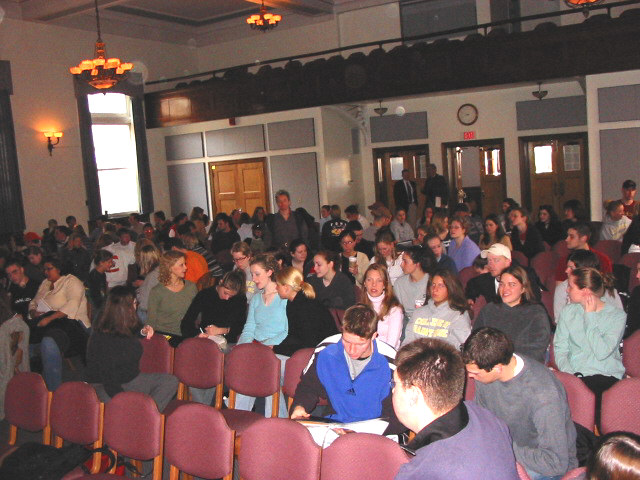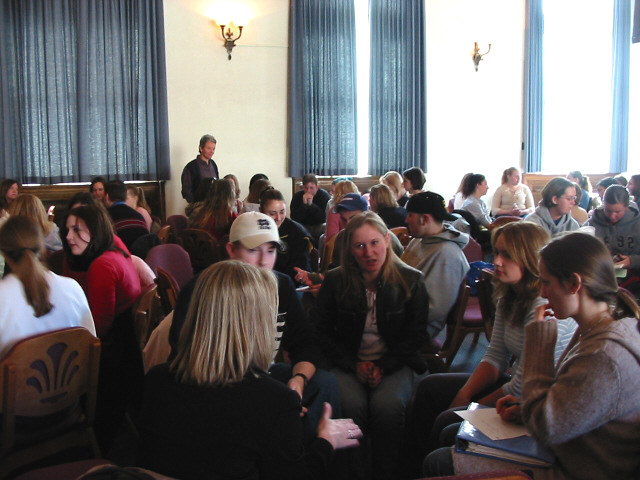
Teach-In
 The
College of Saint Rose
The
College of Saint Rose
In conjunction with the Historians Against the War s National Teach-In Project, the students and faculty in the department of History and Political Science at The College of Saint Rose in Albany, New York scheduled a Teach-In, entitled Iraq: Anatomy of a Crisis, on Thursday, April 10th, from 9:30 AM to 4:00 PM in Saint Joseph Auditorium. We invited faculty across the campus to join us and to bring their classes to this teach-in, which also was publicized in the community at large. Faculty, especially in the school of Arts and Humanities, responded very positively to this appeal and over 500 students attended the Teach-In during the day.
The following professors participated: Benjamin Clansy, Sean Farrell, Risa Faussette, Keith Haynes, Lisa Kannenberg, Angela Ledford, Carl Swidorski, and Bridgett Williams-Searle. We divided the day into sections that paralleled the regular teaching schedule, which meant that there were four separate sessions. To provide context, we introduced each session with very brief remarks that distinguished the Teach-In from a rally and made clear that our purpose was to recreate a classroom environment in which arguments were evaluated on the basis of evidence and reason, not emotion or sensationalism.
Next, we divided students into small groups and asked each group to develop a list of questions, the answers to which might be most helpful to them in deciding whether or not they should oppose the Bush regime s war policy. They were asked to think about the causes and potential consequences of war both for citizens of the United States and for people around the world.
 Then, while
these questions were being compiled, Keith Haynes, a professor of Latin
American history and U.S. foreign policy, offered a brief historical overview
of US relations with Iraq since that nation's birth in the aftermath of
WW I. This presentation, assisted with PowerPoint images and de-classified
documents available from the National Security Archive, emphasized that
the Bush regime s doctrine of unilateral and preemptive exercise of U.S.
military power constituted a dangerous change in the nature of this nation
s 20th century foreign policy tradition. It drew parallels between the
Bush policy and the neo-colonial political projects undertaken by the
British and French in the aftermath of World War I.
Then, while
these questions were being compiled, Keith Haynes, a professor of Latin
American history and U.S. foreign policy, offered a brief historical overview
of US relations with Iraq since that nation's birth in the aftermath of
WW I. This presentation, assisted with PowerPoint images and de-classified
documents available from the National Security Archive, emphasized that
the Bush regime s doctrine of unilateral and preemptive exercise of U.S.
military power constituted a dangerous change in the nature of this nation
s 20th century foreign policy tradition. It drew parallels between the
Bush policy and the neo-colonial political projects undertaken by the
British and French in the aftermath of World War I.
After this 20 minute presentation, the historians and political scientists offered detailed, evidence-laden replies to the students questions and then engaged the students in a broader dialogue. Each session concluded with a brief summary. The student-driven nature of the questions and their variety from one session to another kept each session fresh for the faculty and also for those students who attended multiple sessions. We also distributed some instructional materials, including the declassified US State Department documents from the Reagan Administration, when many of the current Bush regime's policymakers were involved in relations with Iraq.
The faculty who brought their classes to the Teach-In were uniformly pleased with the information that it offered and commended the interesting insights into current policymaking that otherwise were unavailable to students in any of the usual media outlets. Students, many of whom already had decided their positions on the war, acknowledged that they had learned much and some even decided that the issue was more complex than the media had led them to believe. Still others complained that they did not wish to learn anything that might call into question their existing beliefs. Local media outlets were alerted to the Teach-In and were well-represented in the audience, although print media were conspicuous by their absence. Four of the five local TV stations covered the event and, for the most part, fairly; two stations conducted lengthy interviews with faculty participants. There was only one note of media controversy: the local FOX news outlet, without checking its facts with us, claimed that students were unfairly coerced into attending the Teach-In. The evidence for this was said to be an e-mail received from someone claiming to be a student at The College of Saint Rose.
 Keith A.
Haynes
Keith A.
Haynes
Professor of History
Chair, Department of History and Political Science
The College of Saint Rose
432 Western Avenue
Albany, New York 12203
518-454-5203
HAYNESK@mail.strose.edu